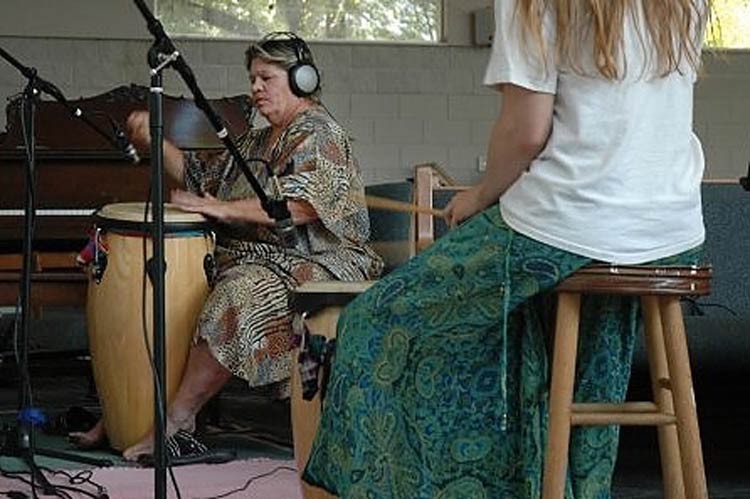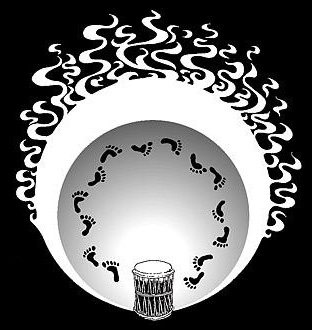
Bonnie Devlin Interview
By Stefanie Katz
March 1997
Background
Bonnie Devlin is an American Unitarian Universalist Minister, music therapist, educator, performer, and activist.
She is the only woman ever initiated as a Huntogi (ceremonial drum master) in the Afro-Haitian vodu religious tradition. She lives in Western Massachusetts.
Why do you drum?
Because I can’t not. That’s why I’m also a priestess and a minister, because it’s my calling and it won’t go away. It’s a curse and a blessing. I won’t live properly if I don’t drum. I began to drum when I was 2-1/2, 3. When I was 8, I got my first Vodu Haitian drum when my parents came back from a trip to Haiti. When they left for Haiti, I was at my aunt’s house and I started screaming, "They went home without me." It was preordained that I would drum.
What attracted you to the drum and what were your main influences?
It was not one person or thing, it was the drum itself. Early on I had an interest in Haiti. When I was in my teens I started having spiritual visions. In 1978 I first heard Haitian Vodu music. I was at the Brooklyn Museum where they were having a major exhibition on Haitian art. I heard the music on a recording as a backdrop to the art and I heard the pulse in my veins. There was an immediate identification. I went to the gift shop to buy a recording of the music and when I listened to it, I felt my core rhythm, my home beat.Through college, I self-taught myself and took some classes on drumming. In 1979, I went to Haiti to work on a project there. I was already a percussionist. There I met with Max Bouvoir. He was a character in "The Serpent and the Rainbow". He served as the ambassador to show tourists what Vodu is like. On this first trip to Haiti, I did not perform, but I did watch Max’s people present. For many years after that I apprenticed with a teacher in New York City. I went back to Haiti to participate in Vodu ceremonies. In 1983 I was initiated as a drum master. When I went back to Haiti, the drum masters let me play, which was very unusual, me being a white American woman. They called me "white woman who plays the drum". They accepted me because I knew the spirits and I knew the rhythms. I was something of a freak show. Little girls would come up to me and would want me to teach them, because it was uncommon for females to play. As for other influences, I did some Brazilian drumming in New York City, Samba music. It is dance music, secular music. I am a spiritualist, and prefer sacred drumming.
I read that you are a teacher and a therapist. What effect do you perceive drumming to have on children in particular?
I have been a music therapist for all ages, from very young children to the elderly. At Lesley College I studied Drumming, Rhythm, and Healing. I learned that percussion is very therapeutic. Rhythm is an organizing principle. There has been much study on the effect of drumming on brain activity. The linear activities of the left brain and the auditory, conceptualizing activities of the right brain come together from drumming. Rhythm is very natural to children. They have many right brain forms of learning. Children go ga-ga over the drum. Drumming is very accessible to them since it does not require as much technique as other instruments to get a sound out of it. This provides instant gratification, and it builds self-esteem because they have confidence from accomplishing something. Children love beats and sound. Drumming also helps develop both fine and gross motor skills in children. The physical activity provides auto-pleasure, automatic-pleasure. It is interesting that often the more aggressive and outspoken children go for the big drums, which echoes with their outgoing nature. Often when a child needs to open up more, we encourage him or her to go for the frame drums or the tom-toms. They learn to hear their own voice sound. It is a lesson in self-assertiveness, self-esteem.
Do you believe there is a connection between drumming and dancing?
There is a cosmic connection between drumming and dance. They can often spot each other. A good drummer must know the dance steps, because the drum is accentuating the body movements. The drummer and dancer tell each other what to do. In sacred cultures, the dance movements have very specific meanings. The Western view of African and African Diasporal dance is that all it takes is a lot of energy and moving around.
In class, we discuss the idea that there seems to be an interesting shift taking place as certain forms of drumming are spreading form the cultures in which they were born to other cultures, in particular American culture. Drumming also seems to be more accessible than ever before. Can you comment on this?
Baba Olatunji stated that there is a "drum frenzy". There seems to be drum circles everywhere. The intense dynamic leads to many controversies. There is much discussion on courtesy and drum circle etiquette. There is much information on the internet and yet it seems that at many drum circles, some people just don’t have a clue. There is also the controversy of natural instruments versus synthetic drums like Remo. I have mixed feelings on this issue. While I advocate Remo drums, natural drums made of animal and wood have the quality of spirit, because they are still alive. Synthetic drums stand up well and don’t break as easily. They have a better chance of lasting longer. There is the controversy of non-Africans versus ethnic cultures. Many African-Americans are frustrated because not more African-Americans are taking classes, so they wind up making money from whites. The problem is that in our white, European-derived culture, everything has to be done quickly. There are these weekend workshops where you can become a Shaman in one weekend. Many people do not realize that something like that takes a whole lifetime. It takes patience to learn a spiritual tradition. If they want to learn spirituality, they must be able to listen. They must master and be one with one rhythm, but most people are more obsessed with learning all the rhythms as fast as possible than understanding. Once you do master and become one with one rhythm, you can learn all the rhythms, but this first rhythm may take a whole lifetime. It bothers me when people refer to rhythms as "stuff" or "it", like they can pile it up in their pockets. This is very, very wrong. There is a difference between embracing a culture and taking it over, such as in the Native American culture. We see a lot of Cultural Imperialism, and also Culture Brokers, who mass produce their own culture to make a quick buck. It takes two to tango. There seems to be a sense of urgency, which is not genuine.
In many drum circles, there seems to be a lot of narcissism and showing off of the ego. They are not saving lives or changing the world. Why is this so compelling? One thing I want to comment on is the difference between power and empowerment. In our culture, we are very disempowered. We seem to have no stake in our own future. When many people look at the drum, they think of power. They tell me that they wish they could have as much power with the drum as I do. I do not have power with the drum, the drum has power with me. I can only empower others. I see too much power-tripping. People using the drum as an aphrodisiac. They drum is very sensuous, but people abuse sensuality when they use it to pick up people. There are many gender issues to be resolved. The drum must be used for a higher cause. It is incredible to work with Cerebral Palsy kids, or Special Needs children, and see the room come alive. I enjoy performing, but using the drum for therapeutic or spiritual purposes is far more interesting than entertainment. It is when it is used for compassion and justice that the drum really gets to shine.
